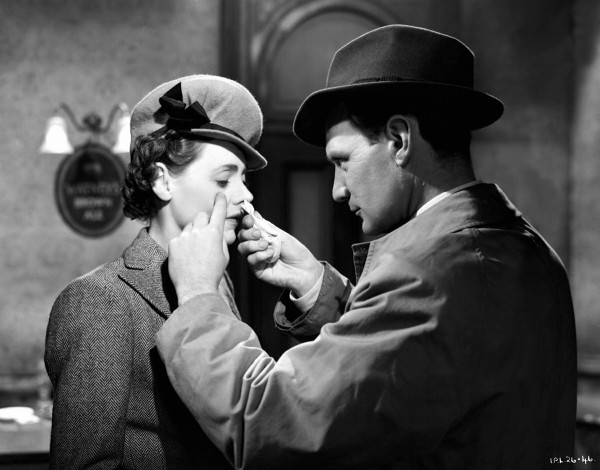
Director: David Lean | Scr: Anthony Havelock-Allan, Ronald Neame Cast: Celia Johnson, Trevor Howard, Stanley Holloway, Joyce Carey | 88′ | Romantic Drama | UK
What makes BRIEF ENCOUNTER such a classic English love story – one that might have lost appeal for today’s younger audiences – is not passion or excitement, although David Lean’s postwar drama has all these, it also embraces very English traits: ones that are highly undervalued in romantic terms today: mystery, gracefulness and gallantry. BRIEF ENCOUNTER was set in 1945. A time where middle class men and women wore hats and gloves and beautifully tailored clothes to go about their daily business; they said ‘please’ and ‘thank you’ and ‘how do you do’. In those days, a woman’s place was in the home: not necessarily cleaning and scrubbing, but making it a pleasant and well-ordered sanctuary for her husband and her children. They were considerate, responsible and well-mannered; or were they just repressed, meek and lacking in conviction?
BRIEF ENCOUNTER is a simple and unsentimental narrative that recounts the quiet satisfaction of a woman in a middle-class marriage that turns to desperation when contrasted with a sudden lighting bolt of realisation that love could be so much more. Set against the romantic backdrop of a railway station with all its connotations of escaping into the night and being carried away, it hinted at a more exciting life beyond the confines of the rainy Northern town in Lancashire.
Noel Coward wrote the script for BRIEF ENCOUNTER adapting it from his one-act play ‘Still Life”. The screenplay was the collaboration of writing trio Anthony Havelock-Allan, Lean and Ronald Neame. His protagonists were ordinary, respectable people: a doctor, Alex (Trevor Howard) and a housewife Laura.(Celia Johnson). Not glamorous or good-looking, but with grace, poise and manners. Stanley Holloway plays the cheeky, decent station master who flirts with Joyce Carey, an outwardly prim but inwardly (one imagines) saucy buffet manageress, and Cyril Raymond, possibly a small time solicitor, who is reasonable and decent as Laura’s husband. Clearly he’s not quite on the same page charismatically as Howard’s doctor, but with the emotional intelligence to suspect his wife has experienced a dalliance, but not sure what it entailed, Loving her, as he clearly does, may not offer the soaring heights of passion, life with him is comfortable and companionable: he is not a philanderer, a drunkard or a bankrupt: “the only one in the world with enough wisdom and gentleness to understand”. Laura will have to realise that in time “just to be ordinary, contended and at peace is sterling silver compared to the small nugget of golden passion that she reaches out to grasp with the doctor. But in BRIEF ENCOUNTER she is starting an exciting journey, one that teeters on the brink of expectancy, the promise of romance that could end in true love, or the paltry acceptance of just how stale and comfy her marriage has become.
Noel Coward was not like the doctor or the solicitor in his play – he was unofficially gay – but realised that his story needed to focus on middle-class people to be a success in 1945. David Lean, a lapsed Quaker and serial monogamist, collaborated four times with the playwright, Coward mentoring Lean in: In Which We Serve, This Happy Breed, Blithe Spirit.
The Noirish melodrama follows Laura and Alec’s chance meeting in the station buffet that will lead to hours of anguished love-making, soul-searching, hand-clutching, clock-watching and doubting as Rachmaninov’s Second Piano Concerto blares out, courtesy of the National Symphony Orchestra, until Alex finally takes his leave to start a new life in South Africa taking his wife and children. In their brief ‘affair’, Alec calls all the shots, makes all the decisions: toying with her emotions, tugging on her heartstrings until finally leaving her for another woman (his wife), in the station buffet, with her self-obsessed friend Dolly Messiter.
The success of BRIEF ENCOUNTER today must surely be the purity of its emotions, the simplicity of its message, the innocent enormity of its scope. Laura’s perfect velvety English voiceover cuts through class, time and tide, because Alec is ultimately the knave. He could have taken her to Johannesburg, leaving his wife and kids. She could have left her husband and children: but that’s a 21st century ‘romance’ and this was 1945. Celia Johnson is the reason why BRIEF ENCOUNTER is ultimately so moving and heartfelt: “This misery can’t last. I must try to control myself. Nothing lasts really. Neither happiness nor despair”. Her anguish, her longing, the desperation in her eyes; all so beautifully portrayed, all so delicately restrained and English in its sensibilities. Surely Trevor Howard’s Alec is merely the counterpoint to her feelings of love, a man in search of a brief fling to add piquancy to his professional and marital routine: he opens her up romantically, fills her with hope and excitement and he abandons her to the rainy streets of an English postwar town. MT
BRIEF ENCOUNTER | 1945-2025